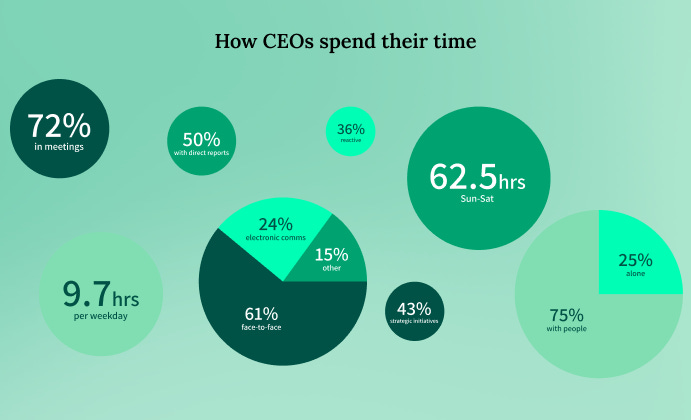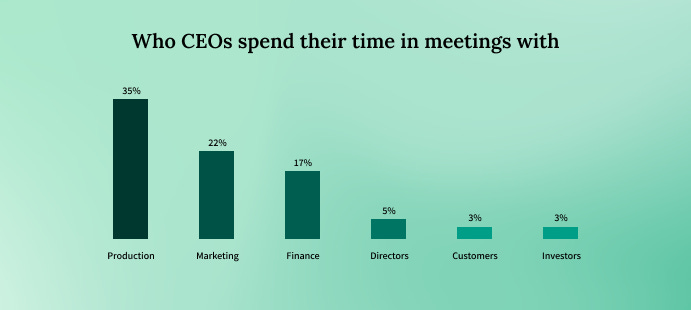When it comes to IR, what is the most efficient use of a CEO's time?
Last weekend was Father's Day, and you could've played a bingo game with the presents I received. Jocks, socks, hankies - you name it, I got it.
I also received one non-cliche present: time to do whatever I wanted (it was marvellous). As a result, I've been reflecting this week on just how precious time is, and as a business leader, I know that you know how I feel.
Running a public company takes a lot of time. Harvard Business Review published two research pieces (here and here) about how CEOs spend their weeks. The conclusion is? You work 62.5hrs per week and still have no time in your day.
I've had the team pull the stats from the report, chuck them into a chart (below), and scoured through to see where the opportunities are for you to win back time.

Insight 1: You spend 50% of your time with direct reports
There are many ways to interpret this stat, which is why I find it so attractive. Let's begin with the end: hands-on CEOs (managerial) are less effective than high-level CEOs (directorial).
So, is it better to spend more or less time with your direct reports? I don't think there is a "right" answer to this question - it depends on the environment. What is revealing, though, is the balance of who the CEO is spending their time with.

To me, the balance seems off. The argument for spending so much time on production is something like, "without a product/service, we don't exist". I agree with this argument, but that same argument applies to every single business function.
Spending 74% of your time on three functions and leaving so little time for company directors, investors, and customers is folly. Without investors, you don't exist. Without customers, you don't exist. Without directors? Well. Maybe directors are a "nice to have" after all 😜.
Insight 2: You spend 72% of your time in meetings
Ease up there, turbo; you're spending 7hrs a day in meetings! As much as we all hate meetings, I think this stat makes sense to a degree. Your job is to lead and delegate, so it makes sense to be spending so much time with other people.
A revealing stat, though, is that about 25% of your week is spent doing "alone tasks". Coincidentally, that almost exactly equals the extra time you’re putting in on weekends and weekdays. Simply put, your meetings take away your time to do other critical tasks, which you end up doing after hours.
Insight 3: You spend 3% of your time with investors
I've already stated that I think the balance is off here, but I want to dive a little deeper on this one.
3% of your week equals two hours. Of those two hours, I would wager that it is rare for you to spend any of that time with an investor outside of your top 20.
Recent statistics show that retail makes up approximately 20% of daily trading volume and hold over $20 trillion in assets. Retail investors are now a recognised significant influence on share price stability and to be ignored at an issuer's peril.
Retail are also fickle, and are quicker to buy and sell thanks to their frictionless trading experience. This means that one of the biggest influencers on your share price are receiving little-to-no attention throughout your week.
“But Ben, I don’t have any time!”
I get it, you're already working 10-hour days, and I'm telling you to make time for retail. I'm not going to highlight a problem without a solution, though! Outside of using InvestorHub, I have some additional tips to help you get more time back into your day.
Action 1: Rebalance your meetings
Understanding how you split your time across functions and needs is an essential first step in figuring out how to get back time. Google Calendar has a built-in insights function, but there are also services you can use for any calendar service to help you categorise your time spent. To keep it simple, I recommend exporting the last two weeks' calendar entries into a spreadsheet, categorising your meetings, and then analysing the balance.
The goal is to find out where you're overcommitting your time (remembering that more-effective CEOs delegate rather than manage). If a function/department is taking up a disproportionate amount of your time, it might signify that a strategic hire (or fire) is needed.
Action 2: Cut meetings without agendas
Your job is to make decisions and guide others' decision-making. An agenda sets clarity and objectives, which enable high-quality decision-making. Without an agenda, you are entering an environment limiting your ability to be an effective leader.
My co-founder, Rhys, has a saying, "slow is smooth, smooth is fast". Forcing agendas that detail the talking points and objectives of a meeting will result in more effective meetings and prevent the need for follow-up meetings. They'll also prevent unnecessary meetings from happening, which could give you back an hour, a day, or a weekend!
Action 3: Spend more time with retail investors
Investing in a retail investor strategy is going to make your long-term access to capital and investor relations efforts a whole lot easier.
Don't know where to start? InvestorHub makes it easy to engage with retail (and non-retail) investors directly. We also have strong relationships with some killer IR firms, so if you're looking to review your IR strategy, then let me know, and I can direct you to some good options.
